西方文化(英文)
西方传统文化英语作文
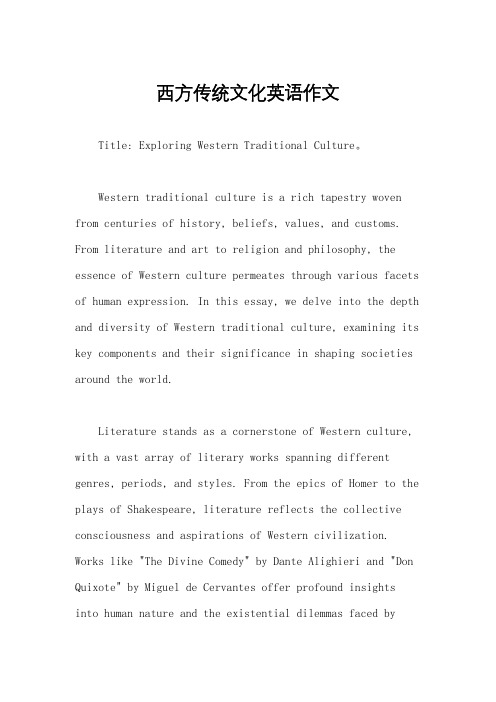
西方传统文化英语作文Title: Exploring Western Traditional Culture。
Western traditional culture is a rich tapestry woven from centuries of history, beliefs, values, and customs. From literature and art to religion and philosophy, the essence of Western culture permeates through various facets of human expression. In this essay, we delve into the depth and diversity of Western traditional culture, examining its key components and their significance in shaping societies around the world.Literature stands as a cornerstone of Western culture, with a vast array of literary works spanning different genres, periods, and styles. From the epics of Homer to the plays of Shakespeare, literature reflects the collective consciousness and aspirations of Western civilization. Works like "The Divine Comedy" by Dante Alighieri and "Don Quixote" by Miguel de Cervantes offer profound insightsinto human nature and the existential dilemmas faced byindividuals.Moreover, Western literature has birthed iconic characters who have transcended time and space to become archetypes of the human experience. Whether it's the tragic figure of Hamlet or the adventurous spirit of Odysseus, these characters continue to resonate with audiences worldwide, serving as mirrors to our own struggles and triumphs.Art, another pillar of Western culture, embodies the creativity and ingenuity of human expression. From the meticulous brushstrokes of the Renaissance masters to the bold experimentation of modern artists, Western artreflects the evolution of aesthetic sensibilities over the centuries. The works of Leonardo da Vinci, Michelangelo, and Vincent van Gogh are celebrated not only for their technical brilliance but also for their ability to evoke emotion and provoke thought.Furthermore, Western art encompasses various movements and styles, each influenced by the socio-political contextof its time. From the romanticism of the 19th century tothe surrealism of the 20th century, artists have continuously pushed the boundaries of artistic expression, challenging conventional norms and perceptions.Religion has also played a significant role in shaping Western culture, providing moral guidance, spiritual nourishment, and a sense of community to millions of people. Christianity, in particular, has been instrumental in shaping Western values and ethics, influencing everything from governance and law to social norms and familial structures.The Judeo-Christian tradition, with its emphasis on love, compassion, and redemption, has left an indeliblemark on Western civilization, inspiring countless works of art, literature, and music. The cathedrals of Europe, with their towering spires and intricate stained glass windows, stand as testaments to the enduring influence of Christian faith and devotion.Philosophy, too, has played a pivotal role in shapingWestern culture, providing a framework for understanding the nature of existence, knowledge, and morality. From the ancient wisdom of Plato and Aristotle to the moderninsights of Descartes and Kant, Western philosophy has grappled with fundamental questions about the meaning of life and the nature of reality.Moreover, Western philosophy has laid the groundworkfor scientific inquiry and technological innovation, fostering a spirit of curiosity and critical thinking that continues to drive progress and advancement in the modern world. The scientific revolution of the 17th century, spearheaded by figures like Galileo, Newton, and Kepler, marked a turning point in human history, paving the way for the age of enlightenment and the dawn of the modern era.In conclusion, Western traditional culture encompasses a rich tapestry of literature, art, religion, and philosophy that has shaped the course of human history and continues to influence our lives today. From the timeless wisdom of ancient texts to the groundbreaking discoveries of modern science, the legacy of Western culture is atestament to the enduring power of human creativity, imagination, and intellect. As we navigate the complexities of the modern world, we would do well to draw inspiration from the cultural heritage that has come before us, enriching our lives and enriching our understanding of what it means to be human.。
西方文化的理解英语作文
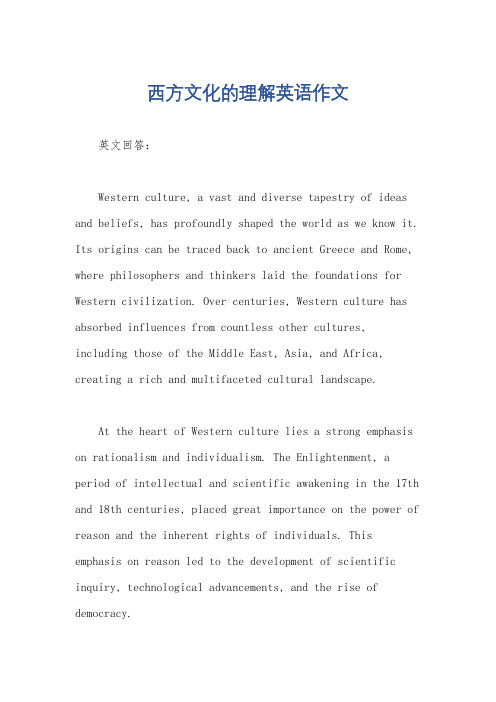
西方文化的理解英语作文英文回答:Western culture, a vast and diverse tapestry of ideas and beliefs, has profoundly shaped the world as we know it. Its origins can be traced back to ancient Greece and Rome, where philosophers and thinkers laid the foundations for Western civilization. Over centuries, Western culture has absorbed influences from countless other cultures,including those of the Middle East, Asia, and Africa, creating a rich and multifaceted cultural landscape.At the heart of Western culture lies a strong emphasis on rationalism and individualism. The Enlightenment, a period of intellectual and scientific awakening in the 17th and 18th centuries, placed great importance on the power of reason and the inherent rights of individuals. This emphasis on reason led to the development of scientific inquiry, technological advancements, and the rise of democracy.Another key feature of Western culture is its emphasis on humanism. The Renaissance, a period of cultural revival in the 14th to 17th centuries, celebrated human potential and the beauty of the natural world. Humanism emphasized the importance of education, the arts, and the pursuit of knowledge.Western culture has also been shaped by Christianity. The teachings of Jesus Christ have played a significantrole in shaping Western values, ethics, and social institutions. Christianity has emphasized the importance of love, compassion, and the equality of all human beings.In the realm of art and literature, Western culture has produced some of the most renowned works in history. From the masterpieces of classical Greek sculpture to the paintings of the Renaissance and the novels of the Enlightenment, Western art and literature have expressed the hopes, dreams, and fears of generations.Western culture has also made significant contributionsto music, philosophy, and science. The music of Western composers like Mozart, Beethoven, and Bach has captivated audiences around the world. Philosophers from Plato to Kant have explored the fundamental questions of existence, knowledge, and ethics. Scientists like Galileo, Newton, and Einstein have pushed the boundaries of human understanding through their groundbreaking discoveries.In conclusion, Western culture is a rich and complex tapestry of ideas and beliefs that has shaped the world in profound ways. Its emphasis on rationalism, individualism, humanism, and Christianity has laid the foundation for many of the institutions and values we hold dear today.中文回答:西方文化。
西方文化了解的英语作文

西方文化了解的英语作文英文回答:Western culture is a rich and diverse tapestry that encompasses a wide range of traditions, beliefs, and values. One aspect of Western culture that I find particularly fascinating is its emphasis on individualism. In Western societies, individuals are encouraged to express their unique identities and pursue their own goals and aspirations. This can be seen in various aspects of Western culture, such as the emphasis on personal achievement, the celebration of individual rights and freedoms, and the encouragement of self-expression in art, fashion, and lifestyle choices.Another interesting aspect of Western culture is its strong emphasis on democracy and the rule of law. Western societies place a high value on the principles of equality, justice, and accountability. This can be seen in the democratic systems of government that are prevalent in manyWestern countries, where citizens have the right to vote and participate in decision-making processes. The rule of law ensures that everyone is subject to the same set of laws and regulations, regardless of their social status or position of power.Furthermore, Western culture is known for itsscientific and technological advancements. Western societies have made significant contributions to fields such as medicine, engineering, and information technology. This emphasis on innovation and progress has led to numerous breakthroughs and advancements that have greatly improved the quality of life for people around the world. For example, Western countries have pioneered the development of vaccines, medical treatments, and communication technologies that have revolutionized healthcare and connectivity.In addition, Western culture places a strong emphasis on education and intellectual pursuits. Western societies value knowledge, critical thinking, and intellectual curiosity. This can be seen in the emphasis on formaleducation, the availability of libraries and educational resources, and the promotion of lifelong learning. Western countries have renowned universities and researchinstitutions that attract students and scholars from all over the world, fostering a vibrant intellectual community.中文回答:西方文化是一个丰富多样的织锦,包含了各种传统、信仰和价值观。
西方文化英文经典选读
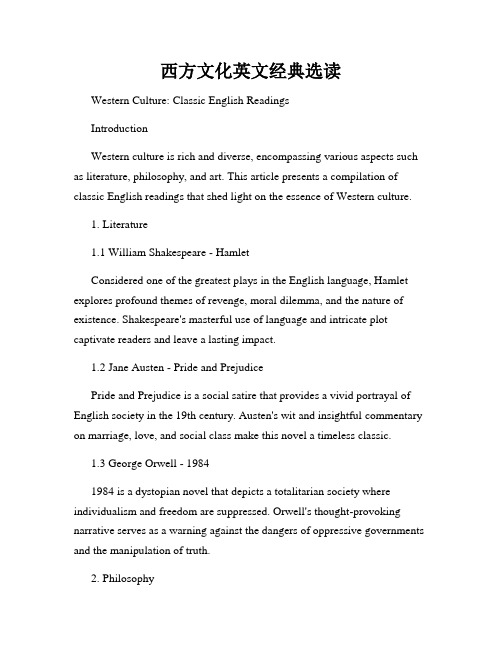
西方文化英文经典选读Western Culture: Classic English ReadingsIntroductionWestern culture is rich and diverse, encompassing various aspects such as literature, philosophy, and art. This article presents a compilation of classic English readings that shed light on the essence of Western culture.1. Literature1.1 William Shakespeare - HamletConsidered one of the greatest plays in the English language, Hamlet explores profound themes of revenge, moral dilemma, and the nature of existence. Shakespeare's masterful use of language and intricate plot captivate readers and leave a lasting impact.1.2 Jane Austen - Pride and PrejudicePride and Prejudice is a social satire that provides a vivid portrayal of English society in the 19th century. Austen's wit and insightful commentary on marriage, love, and social class make this novel a timeless classic.1.3 George Orwell - 19841984 is a dystopian novel that depicts a totalitarian society where individualism and freedom are suppressed. Orwell's thought-provoking narrative serves as a warning against the dangers of oppressive governments and the manipulation of truth.2. Philosophy2.1 René Descartes - Meditations on First PhilosophyDescartes' Meditations is a foundational work in Western philosophy. It explores the nature of reality, the existence of God, and the relationship between the mind and body. This philosophical treatise continues to influence philosophical discourse to this day.2.2 Friedrich Nietzsche - Thus Spoke ZarathustraThus Spoke Zarathustra presents Nietzsche's ideas on the "overman" and the eternal recurrence. This philosophical novel challenges traditional values and advocates for the realization of one's true potential, emphasizing self-exploration and individualism.3. Art3.1 Leonardo da Vinci - The Last SupperRegarded as one of the greatest masterpieces of Western art, The Last Supper showcases da Vinci's exceptional skill in composition, perspective, and storytelling. This iconic depiction of Jesus and his disciples captures the solemnity and emotion of the biblical event.3.2 Vincent van Gogh - The Starry NightThe Starry Night is a mesmerizing painting that reveals van Gogh's unique artistic style and intense emotions. The swirling brushstrokes and vibrant colors convey a sense of turbulence and tranquility, making it an enduring symbol of Western art.ConclusionThese classic English readings provide a glimpse into the richness of Western culture. From Shakespeare's intricate plays to van Gogh's expressive paintings, these works have stood the test of time and continue to inspire and provoke thought. Exploring these masterpieces allows us to appreciate the depth and diversity of Western cultural heritage.Word Count: 331。
西方文化英文小作文
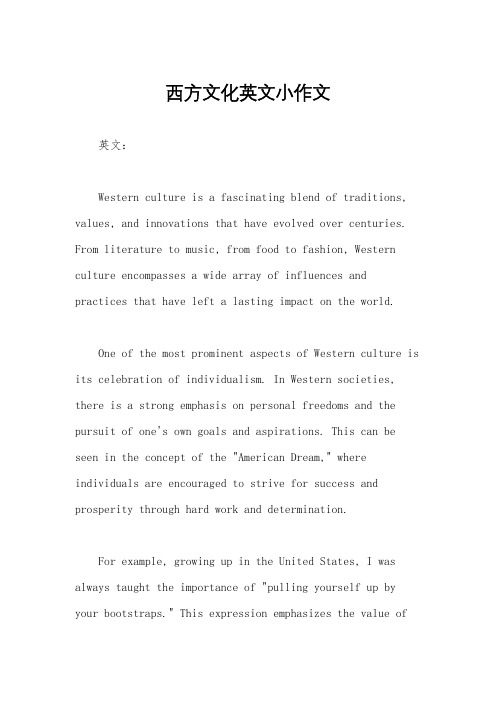
西方文化英文小作文英文:Western culture is a fascinating blend of traditions, values, and innovations that have evolved over centuries. From literature to music, from food to fashion, Western culture encompasses a wide array of influences and practices that have left a lasting impact on the world.One of the most prominent aspects of Western culture is its celebration of individualism. In Western societies, there is a strong emphasis on personal freedoms and the pursuit of one's own goals and aspirations. This can be seen in the concept of the "American Dream," where individuals are encouraged to strive for success and prosperity through hard work and determination.For example, growing up in the United States, I was always taught the importance of "pulling yourself up by your bootstraps." This expression emphasizes the value ofself-reliance and perseverance in the face of challenges.It speaks to the belief that individuals have the power to shape their own destinies through their actions and choices.Another hallmark of Western culture is its richartistic heritage. From Shakespearean plays to Hollywood blockbusters, Western literature and cinema have captivated audiences around the globe. Western music, too, has had a profound influence on popular culture, with genres likerock and roll and hip-hop originating in the West and spreading to every corner of the world.In my own experience, I've found that Western culture places a high value on innovation and progress. Whetherit's in the fields of science, technology, or business, Western societies are constantly pushing the boundaries of what is possible. This spirit of innovation has led to groundbreaking discoveries and advancements that have improved the lives of people everywhere.中文:西方文化是一个迷人的传统、价值观和创新的融合体,已经演变了几个世纪。
西方文化英文简介-图文

Mediterranean Sea
Terra (Roman)= Gaia (Greek)=Earth Mother
Two elements of Western Culture
• The Greco-Roman element • The Judeo-Christian element
Origins of Western Culture
god of agriculture
Cronus
goddess of plenty
Rhea
Hestia Demeter
goddess of agriculture
goddess of the hearth and its fire
Hera Zeus
the lord of the universe
wife of Zeus goddess of women & marriage
The West
• The Classical West Greco-Roman
• The Medieval West Judeo-Christian
• Transitional Period Renaissance & Reformation
• The Modern West
Scientific Revolution Enlightenment Era of Revolution Great Wars & Cold War Dynamic Changes
oceanus’
Phoebe
Rhea
Tethys
Theia
Themis
3 Cyclopes 3 Hecatonchires
['saiklɔps]
中西方文化比较_英文

Halloween is a holiday celebrated on October 31. By tradition, Halloween begins after sunset. Long ago, people believed that witches gathered together and ghosts roamed the world on Halloween. Today, most people no longer believe in ghosts and witches. But these supernatural beings are still a part of Halloween. The colors black and orange are also a part of Halloween. Black is a symbol for night and orange is the color of pumpkins. A jack-o’-lantern is a hollowed-out pumpkin with a face carved on one side. Candles are usually placed inside, giving the face a spooky glow.
The differences between Chinese & Western culture
Culture difference:
ﻬDiet ﻬValues ﻬEtiquette (礼仪) ﻬMythology(神话) ﻬFestival
Diet:
ﻬFirst,when people get together,the westerners pay more attention to personal independence,as opposed to the westerners,chinese people like to sitting around a large table,eating and chatting a lot.
西方文化概论结业论文 英文版

My opinion about the western cultureThe western culture comes from the ancient Greek culture and the ancient Hebrew culture, it has a significant influence on the Western people’s daily life. In my opinion, the western culture can be divided into two parts, the first part is the intersection of the ancient Greek civilization and civilization of ancient Rome , the second part is the religious system and the development of the feudal rule .For the first part, the ancient Greek civilization is the first one to establish the system of Western mythology, and the ancient Rome civilization which continued to put religious and feudal rule together, in this terms ,Bronze and painting have achieved a great success, now, we can see the prosperity of ancient Greek society from the Homa's epic , we can also saw the ancient Romans’ brave and battlewise from the dilapidated Colosseum.For the second part, the Western religious system mainly focus on Christianity and Islam, the two religious system have an irreconcilable conflict ,meanwhile , they developed by recruited more and more believers, many famous war was happended in this terms, the famous one is the Crusade, in the last, the Christianity are mainly distributed in the Western Europe, however the Islam mainly distributed in Eastern Europe, which is today in the Middle East, the religious also promoted the development of architecture, form the unique characteristics of the Gothic style of building and the Baroque architecture, The climax of the Western cultural is the rise of the renaissance.It has an important influence on the development of the Modern European Civilization .In general, the western culture is the development of a comprehensive cultural. Itconsisted of Myth,war,religious and heros.Especially for Christian,nowadays,we can see that almost every Europeans is the believer of the Christian.。
西方文化英语作文介绍模板
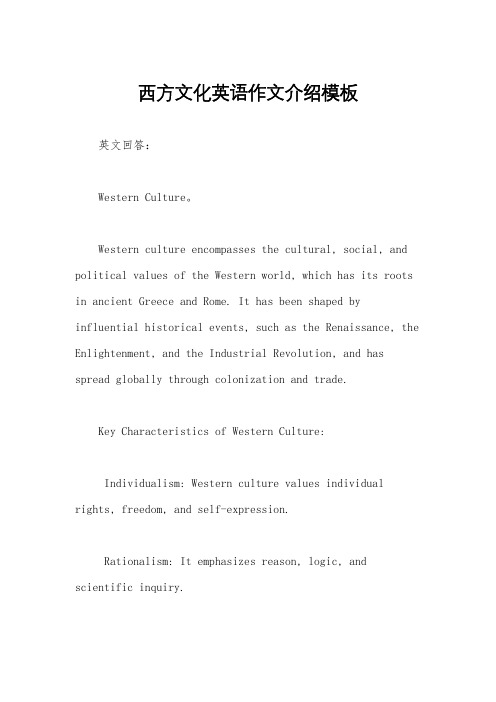
西方文化英语作文介绍模板英文回答:Western Culture。
Western culture encompasses the cultural, social, and political values of the Western world, which has its roots in ancient Greece and Rome. It has been shaped byinfluential historical events, such as the Renaissance, the Enlightenment, and the Industrial Revolution, and has spread globally through colonization and trade.Key Characteristics of Western Culture:Individualism: Western culture values individual rights, freedom, and self-expression.Rationalism: It emphasizes reason, logic, andscientific inquiry.Secularism: Western culture generally separatesreligion from the state and promotes tolerance of different beliefs.Democracy: It values representative government, civil liberties, and human rights.Materialism: Western culture places importance on economic growth, technological advancement, and consumerism.Influence of Western Culture:Western culture has had a profound impact on global affairs. It has:Shaped political systems and economic models worldwide.Influenced art, music, literature, and cinema.Spread scientific and technological advancements.Promoted human rights and civil liberties.Challenges to Western Culture:In recent decades, Western culture has faced challenges, including:Globalization and multiculturalism.The rise of fundamentalism and authoritarianism.Economic inequality and environmental degradation.中文回答:西方文化。
西方文化简介英文版

西⽅⽂化简介英⽂版An Introduction to Western Civilization/CultureWhat is civilization?The word civilization comes from the Latin civilis, meaning civil, related to the Latin civis, meaning citizen, and civitas, meaning city or city-state. Adjectives such as English "civility" developed from this origin.What is Culture?From the Latin cultura, from cultus, meaning to till (the land), to cultivate, to worship, the Latin origin indicates that our civilization and culture is not something new but something that has grown over time.The dictionary definition of culture is, “the arts, customs, and habits that characterize a particular society or nation.” Western culture is a mixture of “arts, customs, and habits” that have formed over a period of more than 2,000 years.All across Europe, in England, Germany, Italy, and Poland, we can find different civilizations and cultures, but they all come from shared origins, most characteristics of civilization and culture come from a combination of firstly, the civilization and culture of ancient Greece. This was incorporated in and further developed by the Greco-Romans, but as Rome was falling, Judeo Christian civilization further developed Western culture.The last major building block in Western Civilization and Culture came with the Germanic Franks in and around 300 –400AD.In this course we will look at the development of the civilization and cultures into what can be called a Western heritage. Whilst Ancient Greece is usually considered the foundational civilization and culture of Europe, we will first have a brief look at the preceding civilization and cultures that gave the Greeks their start.The Origin of Greek CivilizationAround 3000 years before the greatest era of Greek history, civilizations flourished in the area of Mesopotamia (modern Iran and Iraq) and in Egypt. It was between 4000-3000 B.C., that the first cities appeared in the region around the great rivers the Tigris [‘ta?ɡr?s] and Euphrates [ju:?freiti:z]. The first major advances of these civilizations were the use of the wheel.By 3000 B.C., Mesopotamian civilization had made contact with other civilization and cultures of what was known as the Fertile Crescent in the region. An extensive trade network connecting Mesopotamia with the rest of Ancient Western Asia then developed.The achievements of Mesopotamian civilization were numerous. Agriculture, thanks to the development of irrigation, became the main method of living. Farming further flourished after the invention of the plow.As agriculture became more productive, it allowed men to give up working the land and begin their own trades, for example, metalwork or pottery. Between 3000 and 2900 B.C. craft specialization and industries began to emerge which encouraged the growth of cities, all of this led to the first major civilizations of the region.The Sumerians, who inhabited southern Mesopotamia from 3000-2000 B.C., are thought to have been the first civilization and culture to develop non-pictographic (in picture form) writing. Originally, Sumerian writing was pictographic, that is, scribes drew pictures of representations of objects.This proved awkward and the characters were gradually simplified and gave way to conventional signs that represented ideas.The greatest achievement of Sumerian civilization was their cuneiform [?kju:n?f?:m] (wedge-shaped) system of writing, using a reed stylus they made wedge-shaped impressions on wet clay tablets which were then put in the sun to dry. The most common cuneiform tablets record transactions of daily life; counts of cattle kept by herdsmen for their owners, production figures, lists of taxes, accounts, contracts and other parts of organizational life in the community.Another category of cuneiform writing included a large number of basic texts, which were used for the purpose of teaching future generations of scribes. By 2500 B.C. there were schools built just for this purpose, and the Sumerian cuneiform writing was to provide the model for the Greeks when they developed their own written language.Around 1780 B.C. the city of Babylon gained power over Mesopotamia through their ruler, Hammurabi. He was a very efficient ruler, giving the region stability after turbulent times, and transforming it into the central power of Mesopotamia.A great literary revival followed Babylonian independence. One of the most important works of this era of Babylon was the writing of the first known code of laws called the ‘Code of Hammurabi.’ It focused on theft, farming (or shepherding), property damage, women’s righ ts, marriage rights, children’s rights, slave rights, murder, death, and injury. The punishment is different for different classes of offenders and victims.The city of Babylon also features in the Judeo Christian tradition. A story in the Bible is used by Jews and Christians to explain the existence of many different languages and races in the world. According to the biblical book of Genesis 11, at Babylon, humanity began building a ‘Tower of Babel’ in order to reach heaven and gain access to heaven directly from earth without the need of God. To prevent the project from succeeding, God made all the workers speak different new languages so that they could no longer communicate with one another and the work could not proceed, after that time, the people moved away to different parts of Earth, and spoke the different languages they had been given by God.From this story, and the city of Babylon, comes the modern English word babble, or talk in a confusing way. It is also due to the Babylonians that we have 60 seconds in a minute and 60 minutes in an hour. The mathematicians of Babylonia devised a system of counting based on the number 60, from which we get the number of seconds in a minute and of minutes in an hour and the number of degrees (60×6=360) in a circle. Mesopotamia ceased to be a major power after the conquest by Alexander the Great around 400 B.C.While the Sumerians and other groups were busy creating a Mesopotamian civilization, another civilization had appeared to the west. This civilization depended entirely on geography; it was the fertile valley of the Nile River that allowed Egyptian civilization to flourish over the course of many centuries.The art and science of engineering was greatly developed in Egypt, with their skill in surveying allowing them to accurately determine the position of points and the distances between them. These skills were used to outline the bases of the best known images of Ancient Egypt, the pyramids. The first pyramids, built around 2900 B.C., were little more than mud-brick structures, but the greatest building achievements in Egypt were the great pyramids of Giza, built more than 4500 years ago. The early civilizations of Mesopotamia and Egypt certainly could build pyramids, irrigation canals and pottery wheels, and develop cuneiform writing. They are not, however, considered the foundation of civilization and culture of Europe. Although civilization developed in the fertile crescent of Mesopotamia, it was in the civilizations bordering the Mediterranean that Western civilization and culture was truly born. It is the civilization and culture of Ancient Greece that is today seen as being the origin of Western civilization and culture.Ancient Greece is considered by most historians to be the foundational civilization and culture of Western civilization. Ancient Greek civilization has been immensely influential on the language, politics, educational systems, philosophy, art and architecture of the modern Western world.The period of Greek domination of the Mediterranean world lasted approximately 1,500 years from around 1600 BC until the coming of the Roman Empire, it should be noted, that we should not consider it to be one long uninterrupted rule, or that the Greeks were one group.The History of Greek CivilizationAegean Civilization3000-1450BC Minoan Civilization2000BC People from Mycenae went to Greece1600-1200BC Mycenae Civilization Ruled Greece1200-800BC Dark Period for Greece800-490BC The Archaic Period490-336BC The Classical Period336-30BC The Hellenistic Period146BC Greece was incorporated into RomeThe Rise and fall of Mycenaean PowerAt the height of its power, it was prosperous and active. They enlarged their cities, expanded their trade and sacked Troy. It was gone in 1100BC after the Troy War. The period from 1600 BC to about 1100 BC is known as Mycenaean [maisi?ni:?n] Greece after the major city of the period Mycenae.The age of Mycenae has given us the epic poem that has had a profound effect on the body of western literature and art. Transmitted to us through the Romans, the Renaissance and the following generations, this is the work of one author, the man who gave us the story about Troy.The period from which the story came, Mycenaean Greece, ended around 1100 BC, and the period from 1100 BC to around 800 BC is a ‘dark age’ of which little is known. In 800 BC Greece began to emerge from these Dark Ages, and at this time a written record begins to appear. This is the period most consider Classical Greece, but in those days there was no such political unit known as Greece. Greek geography, where every island, valley and plain is cut off from its neighbours by the sea or mountain ranges, dictated that Greece was divided into many small self-governing city communities.。
西方文化导论(英文)
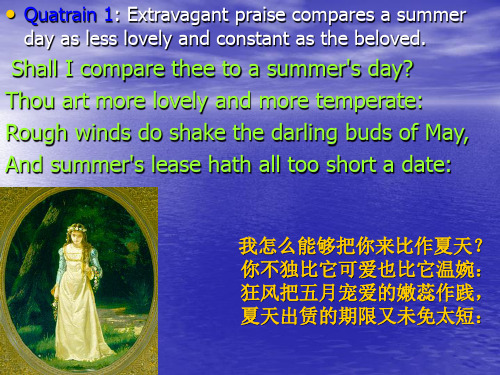
Comments on Leaves of Grass
• 1). Nature’s beauty uplifts the human spirit(line
•
•
15, 23,24 specially refer to this theme).The nature stimulate the mind of human and give them relaxing and satifatory feeling. 2). People sometimes fail to appreciate nature’s wonders as they go about their routines(17 &18) 3). Nature thrives unattended. The daffodils proliferate in splendor along the shore of the lake without the need of the human attention
2. What does “wander” mean?
Questions about the theme
3. Why do you think the poet chooses to personify daffodils in the poem?
4. What is the relation between the poet and daffodils as described in the poem? 5. What’s the function of nature?
The theme
• The poem was about nature and
describing the great power of nature which may influence our life deeply as revealed in the poem. There is not only the visual effect but also the emotional response . • The choose of the word “lonely” in “I wandered lonely as a cloud” instead of other words like carefree, leisure or jolly convey to us the poet’s depression and disconsolateness悲伤 at the very beginning.
西方文化的特点英语作文

西方文化的特点英语作文英文回答:Western culture is a diverse and multifaceted entity that encompasses the beliefs, values, customs, and traditions of the peoples of Europe and their descendants around the world. It has been shaped by a complex and evolving blend of geographic, historical, social, and intellectual influences. Some of the key characteristics of Western culture include:1. Individualism: Western culture places a high value on individualism and personal autonomy. Individuals are expected to be self-reliant and responsible for their own actions. This emphasis on individual rights and freedoms is rooted in the Enlightenment ideals of liberty and equality.2. Rationalism: Western culture emphasizes the use of reason and logic to understand the world. This worldview emerged during the Renaissance and Scientific Revolution,when scholars began to challenge traditional religious and philosophical authorities.3. Science and Technology: Western culture has a strong tradition of scientific inquiry and technological innovation. From the early Greek philosophers to the modern scientific breakthroughs of the 20th century, Western thinkers have sought to understand and control the natural world through empirical observation and experimentation.4. Christianity: Christianity has played a major role in shaping Western culture, providing a moral and ethical framework for many societies. While the influence of religion has declined in recent decades, Christian values continue to influence social norms and institutions.5. Capitalism: Western cultures are largely based on capitalist economic systems, emphasizing private property, free markets, and the profit motive. This economic model has driven economic growth and innovation but has also contributed to social inequality and environmental degradation.6. Democracy: Western cultures value democratic principles of government, where citizens have the right to participate in decision-making. This commitment to representative government has its roots in ancient Greece and has been a defining feature of Western political systems for centuries.7. Human Rights: Western cultures are committed to protecting human rights and dignity. This includes fundamental liberties such as freedom of speech, expression, and assembly, as well as the right to a fair trial and protection from arbitrary arrest and detention.8. Global Influence: Western culture has had a profound impact on the world, spreading its ideas and institutions through colonialism, imperialism, and globalization. Today, Western values and practices are influential in many non-Western societies, creating a truly globalized cultural landscape.中文回答:西方文化的特点。
英美文化介绍 英文版
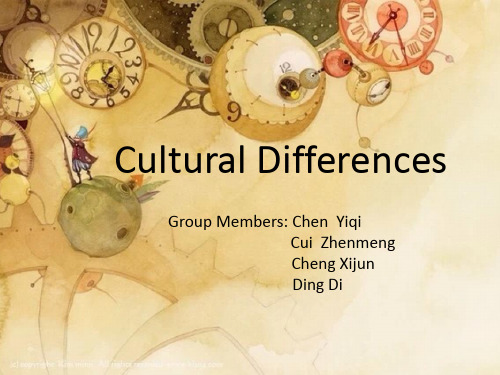
OCCASION
Washington
EATING
American have many different names for mealtimes, including ‘Breakfast’, ‘Brunch’, ‘Elevenses’, ‘Lunch’, ‘Tea’, ‘Dinner’ and ‘Supper’.
Cultural Differences
Group Members: Chen Yiqi Cui Zhenmeng Cheng Xijun Ding Di
CLOTHING
ONE To present with graceful manners in the living room along with culinary skills in the kitchen
古朴,典雅构成白宫建筑风格基调 Simple, elegant constitute the White House building style of fundamental key.
华盛顿纪念碑是美国战争英雄纪念碑,它反映的是美国对历史的态 度 The Washington Monument is American war hero to the memorial, which reflect the is the history of the American attitude .
A traditional breakfast includes sausages, bacon, fried eggs, mushrooms, baked beans, fried tomatoes, and toast with butter. However, these days most people don’t eat a traditional breakfast every day, or even at all. This is because it is very unhealthy, and many people don’t have time to cook.
西方传统文化英文作文
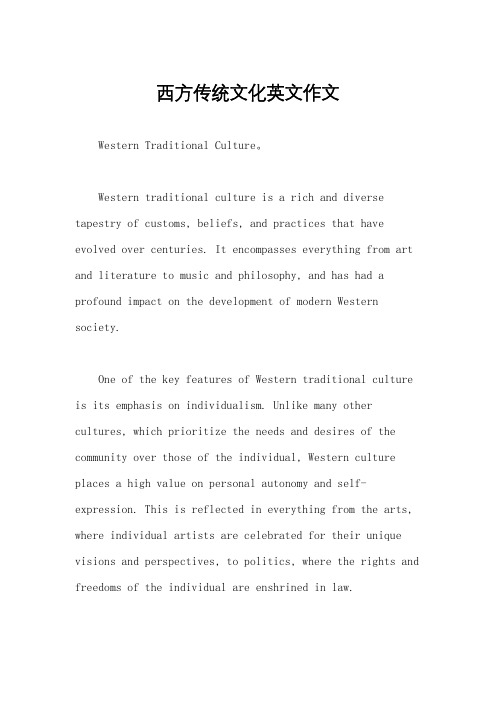
西方传统文化英文作文Western Traditional Culture。
Western traditional culture is a rich and diverse tapestry of customs, beliefs, and practices that have evolved over centuries. It encompasses everything from art and literature to music and philosophy, and has had a profound impact on the development of modern Western society.One of the key features of Western traditional culture is its emphasis on individualism. Unlike many other cultures, which prioritize the needs and desires of the community over those of the individual, Western culture places a high value on personal autonomy and self-expression. This is reflected in everything from the arts, where individual artists are celebrated for their unique visions and perspectives, to politics, where the rights and freedoms of the individual are enshrined in law.Another important aspect of Western traditional culture is its focus on reason and rationality. From the ancient Greeks to the Enlightenment philosophers, Western thinkers have long emphasized the importance of logic, critical thinking, and empirical evidence in understanding the world around us. This has led to many important scientific and technological advances, as well as to the development of a rich tradition of philosophical inquiry.Despite its many strengths, however, Westerntraditional culture is not without its flaws. One of the most significant of these is its history of colonialism and imperialism, which has led to the exploitation and oppression of many non-Western cultures and peoples. Additionally, some critics argue that the emphasis on individualism and rationality can lead to a sense of alienation and disconnection from others and from the natural world.In conclusion, Western traditional culture is a complex and multifaceted phenomenon that has played a major role in shaping the modern world. While it has many admirablequalities, it is important to recognize its limitations and to work to address the negative consequences that have resulted from its historical and cultural legacy. By doing so, we can continue to learn from and appreciate the many valuable contributions that Western culture has made to our global community.。
西方文化 (英文版)
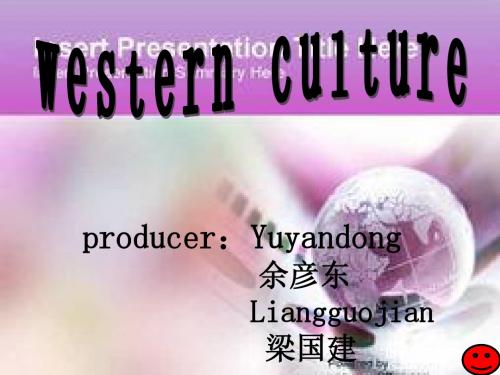
two:diet(饮食)
you have your own plate of food !
drinking
Excessive (过 度的)drinking is never proper, and when toasting Westerners usually only take a sip of their drink
four:education(教育)
students: ask questions actively no matter how clever they are, sit in disorder (混 乱) so that they can communicate with their teachers more convenient, teachers often have lessons below the podium(讲台), and they will approach their students and chat with them at pleasure so that students can get on well with their teachers
logic(几何美学和数 学逻辑)
the West Building often change their structure and materials rapidly
• Ancient Western architecture
•Western modern architecture
The Western traditional architecture shows the eternality(永恒) . It is regarded as God’s creation, and prominence(突出) to beauty is given. In addition, architectural artistry takes priority(优先) .
西方文化英文造句带翻译
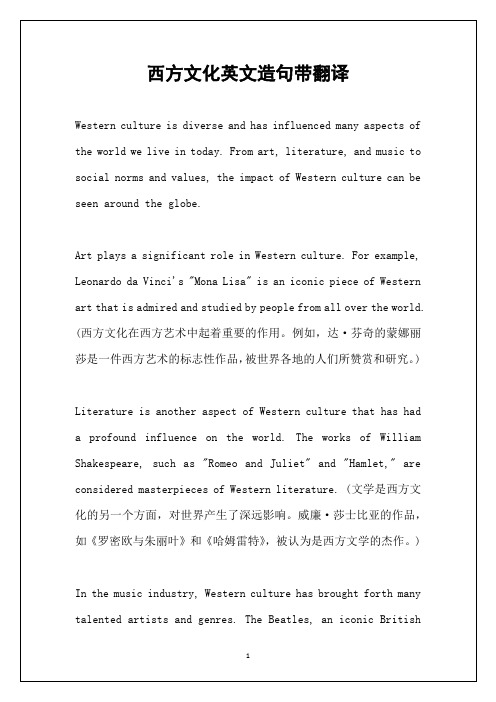
西方文化英文造句带翻译
Western culture is diverse and has influenced many aspects of the world we live in today. From art, literature, and music to social norms and values, the impact of Western culture can be seen around the globe.
Literature is another aspect of Western culture that has had a profound influence on the world. The works of William Shakespeare, such as "Romeo and Juliet" and "Hamlet," are considered masterpieces of Western literature. (文学是西方文化的另一个方面,对世界产生了深远影响。威廉·莎士比亚的作品,如《罗密欧与朱丽叶》和《哈姆雷特》,被认为是西方文学的杰作。)
西方中世纪文化概况(英文版)
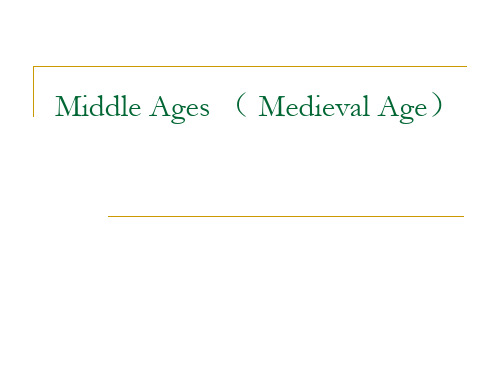
Code of Chivalry
Duties to countrymen and fellow Christians: this contains virtues such as mercy, courage, valor, fairness, protection of the weak and the poor, and in the servanthood of the knight to his lord. This also brings with it the idea of being willing to give one’s life for another’s; whether he would be giving his life for a poor man or his lord.
Middle Ages ( Medieval Age)
Middle Ages is a period of European history from the 5th century to the 15th century Why is it called Middle Ages? The Middle Ages is one of the three major periods in the most enduring scheme for analyzing European history : classical civilization (or Antiquity), the Middle Ages, and the modern period. The period followed the fall of the Western Rome Empire in 476, and preceded the Early Modern Era.
西方文化背景-文艺复兴(英文)[1]
![西方文化背景-文艺复兴(英文)[1]](https://img.taocdn.com/s3/m/792e4529ed630b1c59eeb5cf.png)
Start of Renaissance
Renaissance happened gradually at different places at different times. The movement occurred in different countries with different emphasis. The impact with Italy was mostly in fine arts. (艺术—指诗
7
Ⅱ. Distinctive Features began with the rediscovery of the GrecoRoman civilization Emphasized reason, a questioning attitude, experimentation, and free inquiry (rationalism) Glorified the individual and approved worldly pleasures, and focused attention upon secular matters (humanism)
3
II Historical Background
1558 Death of Mary, accession of Elizabeth I
1576 The first playhouse built in London 1588 Defeat of the Spanish Armada, apex of England 1603 Death of Elizabeth I, accession of James I
歌、音乐、绘画、雕塑、建筑等)
In France it was literature. In England it was philosophy and drama. The starting place of the Renaissance is almost universally ascribed to(把…归于)Central Italy, especially the city of Florence. Italy— cradle of the Renaissance.
- 1、下载文档前请自行甄别文档内容的完整性,平台不提供额外的编辑、内容补充、找答案等附加服务。
- 2、"仅部分预览"的文档,不可在线预览部分如存在完整性等问题,可反馈申请退款(可完整预览的文档不适用该条件!)。
- 3、如文档侵犯您的权益,请联系客服反馈,我们会尽快为您处理(人工客服工作时间:9:00-18:30)。
(1) Philosophy • Stoicism 斯多葛学派 • virtue is sufficient for happiness • a sage was immune to misfortune. • Cicero • divine providence(天道); morality; duty
• Universe was al and reason had to be the basis for society and law.
Marcus Tullius Cicero
• A man of courage is also full of faith. •
A home without books is a body without soul.
Horace: lyric poet and critic, famous for his poetic forms.
Book of Satires, Odes and Epistles
• (4) Architecture
• The architecture of ancient Rome adopted the Greek style for its own purposes, but the Romans also developed a new kind. They were more utilitarian and showed an interest in grandeur and scale.
The Colosseum(罗马斗兽场,圆形大剧场)
Baths of Diocletian
Baths of Caracalla
• Romans used the arch, the vault and the dome, and discovered how to make concrete.
• (3) Literature
• Virgil (October 15, 70 BC – September 21, 19 BC) was a classical Roman poet, best known for three major works—the Eclogues (or Bucolics), the Georgics, and the Aeneid.
• They constructed many public edifices which still existed today and became the famous key point of interest for the world.
the Basilicas 最初是市政厅,最后成为天主教堂的主 要建筑风格
• Oratory was an art to be practiced and learnt, and good orators commanded respect.
• To become an effective orator was one of the objectives of education and learning.
• These styles still have impact on modern architecture.
• (5)Sculpture and painting • well-preserved figures • paintings were typically colorful
and decorative • wall paintings, mosaic ceiling
• According to the law of nature it is only fair that no one should become richer through damages and injuries suffered by another.
• Lucretius: poet and philosopher • On the Nature of Things • Matter is eternal • The universe is made up of atoms and the void • Death is nothing to us. It’s only the natural
• At 6
• Both boys and girls were taught the basics of reading, writing and arithmetic.
• From the age of twelve, they would be learning Latin, Greek, grammar and literature, followed by training for public speaking.
and floor work
Education
• Boys: Roman law, customs, and physical training to prepare for eventual recruitment into the Roman army.
• Girls :received instruction from their mothers in the art of spinning, weaving, and sewing.
fulfillment of life. A rational and proportional enjoyment of life is all that matters. Sorrow and anxiety come from but an ignorant emotionalism.
(2) History • Roman Historians: Sallust and Livy • History of Rome • Concerns for justice and morality
Religion
Roman deities Polytheists
The Pantheon (万神殿)was dedicated to the worship of all Roman deities.
• Imperial Cult • Judaism • Christianity
• By the 5th century Christian hegemony had rapidly changed the Empire's identity even as the Western provinces collapsed. Those who practiced the traditional polytheistic religions were persecuted, as were Christians regarded as heretics by the authorities in power.
